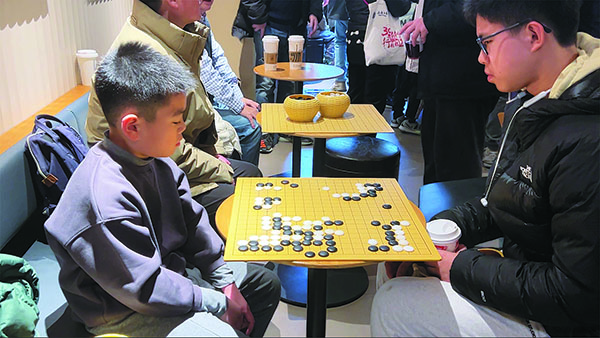

The club has also taken root online. Regularly streamed live games attract hundreds of viewers from across China.
This unique blend of Shanghai's robust coffee culture and traditional Chinese board game culture has created the perfect venue. As of 2022, Shanghai is a city with over 7,000 such venues. These coffee shops have blossomed into lively gathering spots.
"Community life often blends with urban space, forming the city's unique characteristics," says Chen Zhiyuan, deputy-general manager of Shanghai Golinksworld Co. "Perhaps only in Shanghai can Go and coffee shops naturally blend."
Rather than disperse the gatherings, the Starbucks branch opted to provide balanced support to the growing community. Store management simply requested players keep their voices low in order to avoid bothering other customers, and to consider purchasing a drink. Some players said that, during breaks, staff may keep pieces and boards for them. At a recent in-store competition, the cafe even gave away free samples of recently launched beverages to participants.
Most Go players are also aware of their unspoken duty to support the coffee shop that hosts their hobby. It's very common to see players buy a coffee before starting a match. Where food and drink were once sole offerings, this third space has become much more — now cultivating unique experiences through new partnerships that enrich the customer experience.
Such Go matches are regularly held elsewhere as well, like community public chess rooms, and a Costa cafe in the Pudong New Area. Liu Shizhen, secretary-general of the Shanghai Weiqi Association, has observed the resurgence of Go. He views its growing popularity as proof that this traditional pastime remains vital to the cultural lives of Shanghai citizens.
"Since their emergence, online platforms fragmented player communities," Liu says. "Yet, interacting face-to-face through in-person social exchanges is integral to Go's cultural essence."
Under such momentum, Liu notes that the association is working to better serve a diverse range of needs. Some local players, for instance, are dissatisfied with the current event format, as experienced adults hesitate to compete alongside the young players. However, adult-only divisions pose challenges, because registration numbers are always too low to feasibly organize separately.
According to Liu, an intelligent training room is set up for amateur Go players, which allows registered participants to engage in ranking matches through offline human-machine pairings. Additionally, in order to arrange more events and competitions for their members, the association is collaborating with Go clubs in districts throughout the city to collect member information.
As Liu affirms, the traditional pastime continues to nurture intrinsic values amid a modern transition. It is hoped that more measures will provide a better environment for enthusiasts of all aptitudes and backgrounds to enjoy the game as part of a more enriching cultural life.
Zheng Zheng contributed to this story.